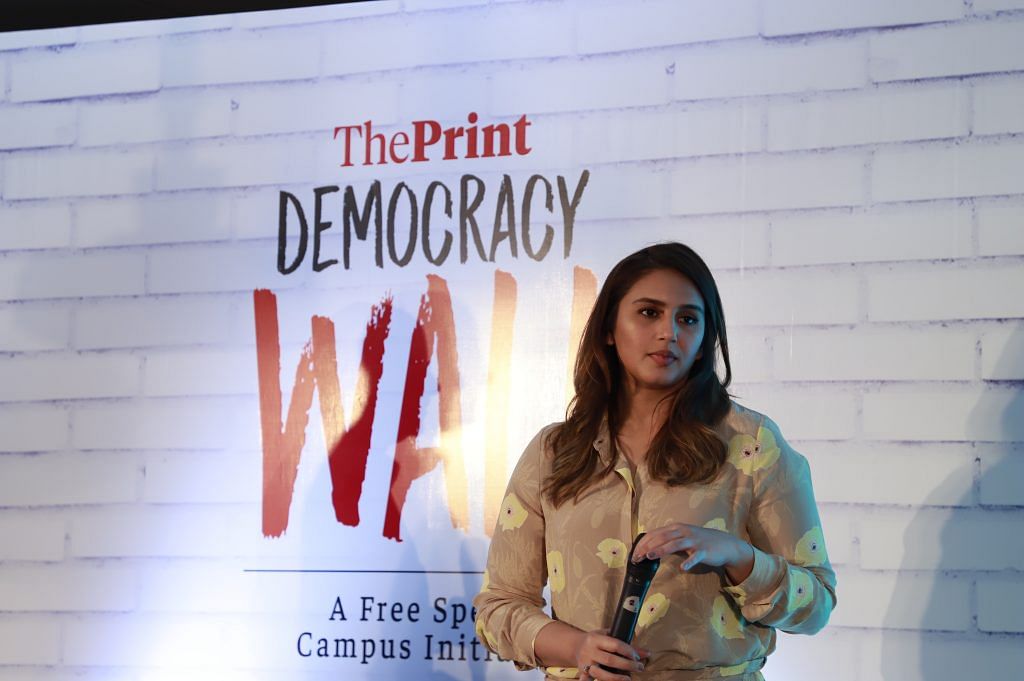The actor also said that women didn’t speak up against sexual harassment in Bollywood because they were afraid of potential consequences.
Bengaluru: It was extremely sad that the media was having a field day with the coverage of Bollywood star Sridevi’s death, but the responsibility fell to viewers to stop watching what news channels were dishing out, actor Huma Qureshi said Tuesday.
“An icon in our country has passed away and I think it’s extremely sad that people think they can have a field day. As media, and as viewers, it is also our responsibility — stop watching. This is not how we progress towards a civil society,” she told ThePrint’s Editor-in-Chief Shekhar Gupta at Democracy Wall.
Democracy Wall is a monthly free speech campus initiative organised by ThePrint in collaboration with Facebook. The second edition of the event at Jain University in Bengaluru featured Qureshi, Congress leader Sachin Pilot, rapper Sofia Ashraf, IPS officer D.Roopa, lawyer Manasa Venkatraman, political commentator Meghnad, and comedian Aravind S.A.
On sexual harassment in Bollywood
Actor Richa Chadha in the previous edition of Democracy Wall had spoken about women’s silence about sexual harassment in the Hindi film industry. Qureshi echoed some of her views and explained why women in the film industry weren’t speaking up about harassment they faced.
On being asked how common harassment was, Qureshi said,“Unfortunately when women in our society speak up about anybody, even in their family, taking advantage of them, they always face flak for it.”
“The industry is in the limelight, and women fear that they’ll stop getting work or the male lobby will move against them and they’ll be marginalised. It’s a fact. Anywhere there are men and women in the world, it is common,” she said.
Qureshi, who is known for playing strong women in films, asserted the right of all women to self-determination.
“I don’t think anyone has the right to tell any girl how she should dress, what views she should have, if she should be fair or not, tall or not tall. These are restricting boxes we keep putting women into, and we need to move beyond,” she said.
On nepotism
Speaking about dealing with nepotism in the industry, Qureshi said, “Coming as an outsider it helps having a foot in the door, but ultimately its your ability and talent that takes you ahead in life.”
However, she says she understands why many aspirants have their spirit broken when they come to Mumbai,
“My experience wasn’t handed to me on a platter. I worked very hard, and it’s been difficult. Every movie I’ve done in my life, I’ve auditioned for it,” she said.
On intolerance against art
Qureshi said she believes every work of art deserves to be released to the general public, whether or not they agree with it.
“Any preemptive fear about a work of art is quite silly. If you have an opinion, you should be allowed to express it. I thought Swara Bhasker wrote a wonderful piece (on Padmaavat), I told her also,” she said.
Qureshi said that as a society we have become increasingly intolerant about differing opinions.
“We need to stop getting offended so easily. Where’s our sense of humour?” she said.
The critically acclaimed actor believes that Bollywood needs to seen as a bastion of society’s moral correctness.
“Sometimes films also have to show the gruesome and negative aspects of society,” she said.
